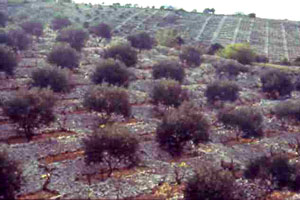|
A definition of biodiversity
In the Convention on
Biological Diversity signed by many member states
at the Earth Summit held in Rio de Janeiro (Brazil)
in 1992, explains biodiversity as follows:
"Biological diversity" means
the variability among living organisms from all sources
including terrestrial, marine and other aquatic ecosystems
and the ecological complexes of which they are part;
this includes diversity within species, between species
and of ecosystems.
Types of biodiversity
Biodiversity is a generic term that can be related
to many environments and species, for example, forests,
freshwater, marine and temperate environments, the soil,
crop plants, domestic animals, wild species and micro-organisms.
Basically it can be classified according to three
types of diversity:
Of particular importance are the taxonomically isolated
species, as they have little similarity to other species
and therefore are unique with respect to their genetic
structure. These species are often endemic meaning limited
to one specific area. Their extinction would mean a
greater loss for global biodiversity rather than just
the extinction of a species.
Distribution of Biodiversity in Europe
In Europe, biodiversity is very unevenly distributed
with the least variety of ecosystems and lowest diversity
occurring in Northern Europe. Centres of high biodiversity
are to be found in the Mediterranean (Italy, Spain,
Greece, France) and on the fringes of Europe (Bulgaria,
Ukraine, Georgia, Armenia, Turkey), with over 5,000
endemic plant species that occur only in these countries.
The Mediterranean is Europe's richest sea in terms of
biodiversity.
The importance of biodiversity
Biodiversity is often used to draw attention to issues
related to the environment. It can be closely related
to
- the health of ecosystems.
For example, the loss of just one species can have
different effects ranging from the disappearance
of the species to complete collapse of the ecosystem
itself. This is due to every species having a certain
role within an ecosystem and being interlinked with
other species.
- the health of mankind.
Experiencing nature is of great importance to humans
and teaches us different values. It is good to take
a walk in the forest, to smell flowers and breath
fresh air. More specifically, natural food and medicine
can be linked to biodiversity.
|
Example: The importance of biodiversity in the Black
Sea
The Black Sea region used to be one of the most important
areas for fisheries and for food and income for local
people. Sturgeons (Acipenser sp.), mullets (Mugil
sp.), and mackerel (Scomber sp.) as well
as other species have been extensively exploited in
this area. However, human activities related to agriculture,
shipping and tourism now exert strong pressure on the
environment, especially in the northern part of the
Black Sea, and are taking their toll on biodiversity
and damaging fish stocks.
Threats to Biodiversity
Large amounts of fertilizers were carried to the sea
from agricultural areas along the large rivers, such
as Don, Dnepr, and Dnjestr. Oil leaked into the sea
from ports on the eastern shores and directly from tankers
crossing the Mediterranean. Wastewater from cities and
heavily visited coastal tourist towns was discharged
without any purification.
Consequences for the ecosystem
All of this leads to pollution and eutrophication meaning
the enhanced blooming of planktonic algae due to increased
nutrient loads. Planktonic algal blooms lower the water
transparency letting only a little amount of light through
the water where makrophytes usually grow. This is how
the natural belt of bottom vegetation along the Black
Sea coast has been destroyed. For example, the vertical
distribution range of Cystoseira spp. decreased
from 0-10m to 0-2,5m.
The consequences were drastic because the habitat is
of major importance as a nursery for spawn and hatchlings
of many marine species. This led to a drop in reproduction
rates and hence fish stocks.
Sturgeon populations
For the economically important sturgeons, some human
activities caused a rapid decline in reproduction rates:
All major rivers were dammed for producing hydroelectrical
power thus cutting off the migration routes for the
sturgeon. This had serious consequences as the fish
live in the sea but need to swim up rivers to spawn.
The carnivor jellyfish Mnemiopsis, was introduced
to the Black Sea by accident in the early 1980s by ballast
water from tankers. This alien species did not have
any natural predators in the area and reproduced rapidly
forming large populations. Like sturgeon and other fish
species the jellyfish feeds on planktonic eggs and larvae.
Competition for food became stronger and eventually
the jellyfish outcompeted the causing their dimise.
The overfishing and the accidental introduction of
the ctenophore Mnemiopsis leydyi in the Black Sea, resulted
in the collapse of the pelagic fisheries of the area.
The effect of over fishing caused the decline of pelagic
fish biomass and the optimal conditions that M. leydyi
thrived on in the Black Sea.
The reduced number of planktivorous fish caused the
increase of M. leydyi, and the decline of species diversity
of mesozooplankton and ichthyoplankton (link
to Shiganova, 1998).
The results
The decline in ichthyoplankton affected the commercial
fish stocks and therefore the total biomass. As a result
the number of commercial fish species was reduced from
48 to 6 and the commercial fish catches declined from
400,000 tons to only 50,000 tons, leaving a collapsed
fisheries sector and large unemployment. The loss of
fisheries in the Black Sea after the introduction of
Mnemiopsys is estimated at hundreds of millions
of dollars every year.
The role of ICZM
The ongoing neglect of natural resources and ecological
interrelationships resulted in a disastrous development,
which can hardly be reversed. In order to restore some
of the functions within this old ecosystem, new approaches
need to be applied that do not only focus on factors
just beneficial to men, but also keep in mind the consequences
for other sectors as well.

|